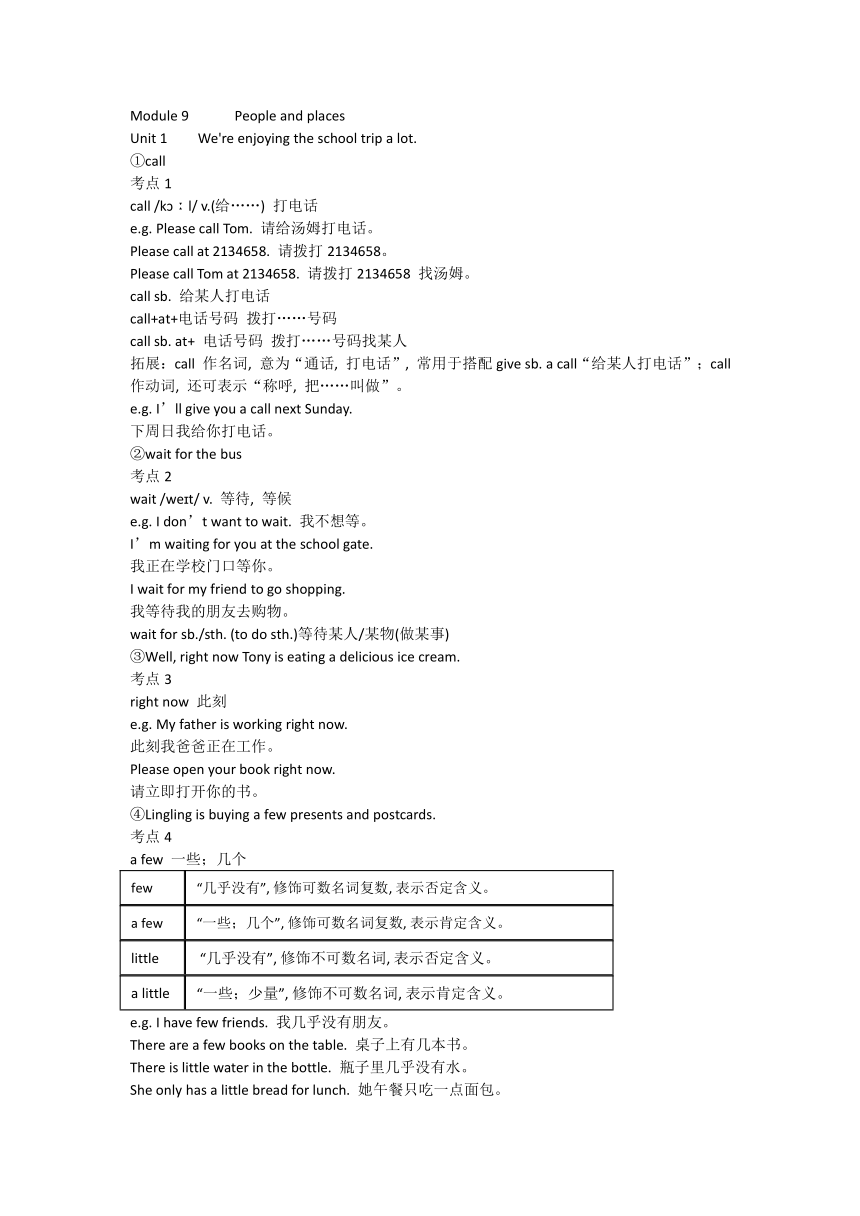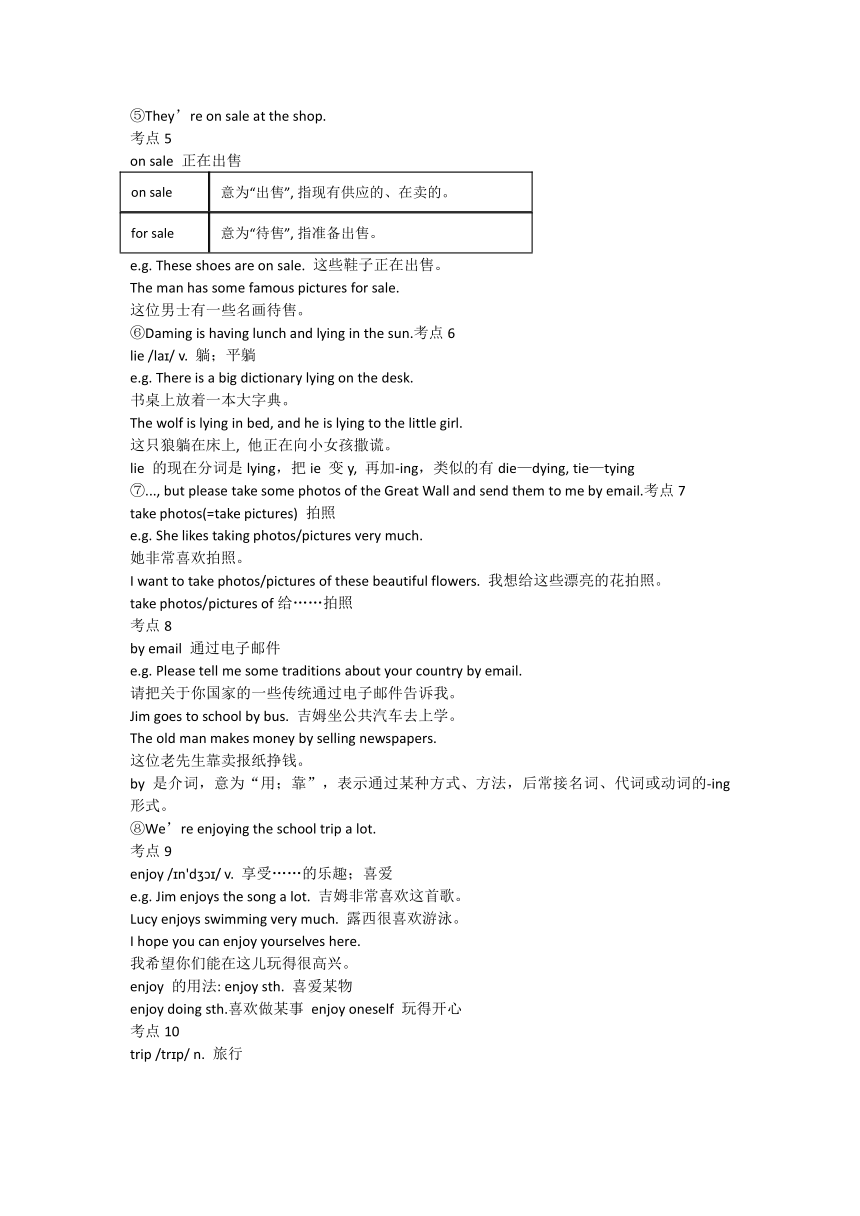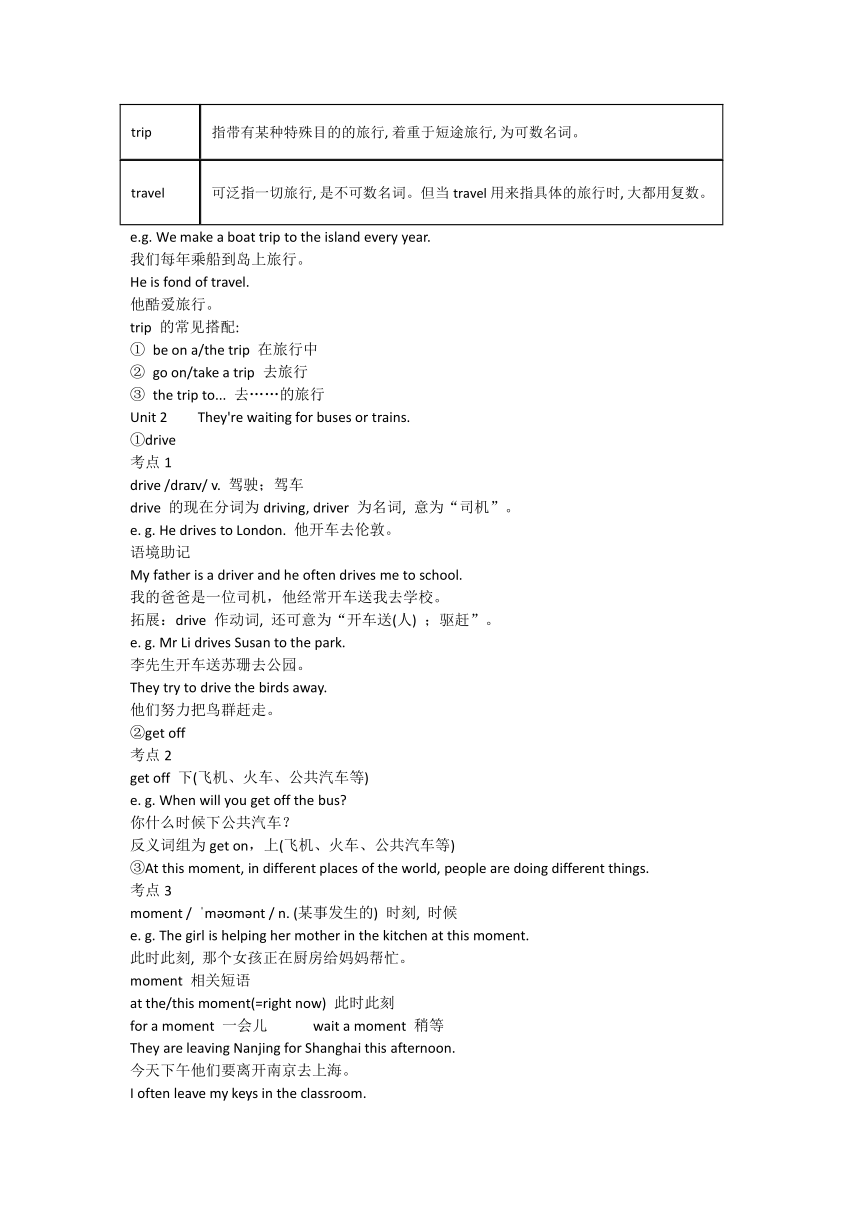Module 9 复习讲义 外研版英语七年级上册
文档属性
| 名称 | Module 9 复习讲义 外研版英语七年级上册 |  | |
| 格式 | docx | ||
| 文件大小 | 23.6KB | ||
| 资源类型 | 教案 | ||
| 版本资源 | 外研版 | ||
| 科目 | 英语 | ||
| 更新时间 | 2023-09-06 07:17:33 | ||
图片预览



文档简介
Module 9 People and places
Unit 1 We're enjoying the school trip a lot.
①call
考点1
call /k l/ v.(给……) 打电话
e.g. Please call Tom. 请给汤姆打电话。
Please call at 2134658. 请拨打2134658。
Please call Tom at 2134658. 请拨打2134658 找汤姆。
call sb. 给某人打电话
call+at+电话号码 拨打……号码
call sb. at+ 电话号码 拨打……号码找某人
拓展:call 作名词, 意为“通话, 打电话”, 常用于搭配give sb. a call“给某人打电话”;call 作动词, 还可表示“称呼, 把……叫做”。
e.g. I’ll give you a call next Sunday.
下周日我给你打电话。
②wait for the bus
考点2
wait /we t/ v. 等待, 等候
e.g. I don’t want to wait. 我不想等。
I’m waiting for you at the school gate.
我正在学校门口等你。
I wait for my friend to go shopping.
我等待我的朋友去购物。
wait for sb./sth. (to do sth.)等待某人/某物(做某事)
③Well, right now Tony is eating a delicious ice cream.
考点3
right now 此刻
e.g. My father is working right now.
此刻我爸爸正在工作。
Please open your book right now.
请立即打开你的书。
④Lingling is buying a few presents and postcards.
考点4
a few 一些;几个
few “几乎没有”, 修饰可数名词复数, 表示否定含义。
a few “一些;几个”, 修饰可数名词复数, 表示肯定含义。
little “几乎没有”, 修饰不可数名词, 表示否定含义。
a little “一些;少量”, 修饰不可数名词, 表示肯定含义。
e.g. I have few friends. 我几乎没有朋友。
There are a few books on the table. 桌子上有几本书。
There is little water in the bottle. 瓶子里几乎没有水。
She only has a little bread for lunch. 她午餐只吃一点面包。
⑤They’re on sale at the shop.
考点5
on sale 正在出售
on sale 意为“出售”, 指现有供应的、在卖的。
for sale 意为“待售”, 指准备出售。
e.g. These shoes are on sale. 这些鞋子正在出售。
The man has some famous pictures for sale.
这位男士有一些名画待售。
⑥Daming is having lunch and lying in the sun.考点6
lie /la / v. 躺;平躺
e.g. There is a big dictionary lying on the desk.
书桌上放着一本大字典。
The wolf is lying in bed, and he is lying to the little girl.
这只狼躺在床上, 他正在向小女孩撒谎。
lie 的现在分词是lying,把ie 变y, 再加-ing,类似的有die—dying, tie—tying
⑦..., but please take some photos of the Great Wall and send them to me by email.考点7
take photos(=take pictures) 拍照
e.g. She likes taking photos/pictures very much.
她非常喜欢拍照。
I want to take photos/pictures of these beautiful flowers. 我想给这些漂亮的花拍照。
take photos/pictures of给……拍照
考点8
by email 通过电子邮件
e.g. Please tell me some traditions about your country by email.
请把关于你国家的一些传统通过电子邮件告诉我。
Jim goes to school by bus. 吉姆坐公共汽车去上学。
The old man makes money by selling newspapers.
这位老先生靠卖报纸挣钱。
by 是介词,意为“用;靠”,表示通过某种方式、方法,后常接名词、代词或动词的-ing形式。
⑧We’re enjoying the school trip a lot.
考点9
enjoy / n'd / v. 享受……的乐趣;喜爱
e.g. Jim enjoys the song a lot. 吉姆非常喜欢这首歌。
Lucy enjoys swimming very much. 露西很喜欢游泳。
I hope you can enjoy yourselves here.
我希望你们能在这儿玩得很高兴。
enjoy 的用法: enjoy sth. 喜爱某物
enjoy doing sth.喜欢做某事 enjoy oneself 玩得开心
考点10
trip /tr p/ n. 旅行
trip 指带有某种特殊目的的旅行, 着重于短途旅行, 为可数名词。
travel 可泛指一切旅行, 是不可数名词。但当travel 用来指具体的旅行时, 大都用复数。
e.g. We make a boat trip to the island every year.
我们每年乘船到岛上旅行。
He is fond of travel.
他酷爱旅行。
trip 的常见搭配:
① be on a/the trip 在旅行中
② go on/take a trip 去旅行
③ the trip to... 去……的旅行
Unit 2 They're waiting for buses or trains.
①drive
考点1
drive /dra v/ v. 驾驶;驾车
drive 的现在分词为driving, driver 为名词, 意为“司机”。
e. g. He drives to London. 他开车去伦敦。
语境助记
My father is a driver and he often drives me to school.
我的爸爸是一位司机,他经常开车送我去学校。
拓展:drive 作动词, 还可意为“开车送(人) ;驱赶”。
e. g. Mr Li drives Susan to the park.
李先生开车送苏珊去公园。
They try to drive the birds away.
他们努力把鸟群赶走。
②get off
考点2
get off 下(飞机、火车、公共汽车等)
e. g. When will you get off the bus
你什么时候下公共汽车?
反义词组为get on,上(飞机、火车、公共汽车等)
③At this moment, in different places of the world, people are doing different things.
考点3
moment / m m nt / n. (某事发生的) 时刻, 时候
e. g. The girl is helping her mother in the kitchen at this moment.
此时此刻, 那个女孩正在厨房给妈妈帮忙。
moment 相关短语
at the/this moment(=right now) 此时此刻
for a moment 一会儿 wait a moment 稍等
They are leaving Nanjing for Shanghai this afternoon.
今天下午他们要离开南京去上海。
I often leave my keys in the classroom.
我经常把我的钥匙落在教室里。
leave 的用法
leave A 离开A 地
leave for B 前往B 地
leave A for B 离开A地前往B 地
⑤Most people are sleeping.
考点5
most /m st/ adj. 大部分(的) ;大多数(的)
most 后可加可数名词复数或不可数名词, 后面的谓语动词单复数要根据most 修饰的名词而定。
e. g. Most water in the city is dirty.
这个城市的大部分水是脏的。
Most animals love their children.
大部分动物爱它们的孩子。
most /m st/ adj. 大部分(的) ;大多数(的)
most 后可加可数名词复数或不可数名词, 后面的谓语动词单复数要根据most 修饰的名词而定。
e. g. Most water in the city is dirty.
这个城市的大部分水是脏的。
Most animals love their children.
大部分动物爱它们的孩子。
⑥Some people are still working and some are going home from work.
考点6
still /st l/ adv. 依然, 依旧
e. g. He is still busy. 他依旧很忙。
He is still sleeping at 9:00 a. m. 早上九点他仍然在睡觉。
Do you still go fishing every Sunday
你每周日仍然去钓鱼吗?
still强调某事仍在进行中,多用于肯定句或疑问句中。
⑦Thank you for your postcard from the Great Wall.
考点7
thank you for. . . 因……而感谢你
e. g. Thank you for helping me with my maths.
=Thanks for helping me with my maths.
感谢你帮助我学数学。
与thanks for同义,其中for为介词,后接名词或动词的-ing 形式。
Unit 3Language in use
①Are you having a good time
考点1
have a good time 玩得高兴;过得愉快
e.g. We are having a good time at the party.=We are having fun at the party.=We are enjoying ourselves at the party. 我们在聚会上玩得正开心。
—We will go to Hong Kong for holiday.
我们要去香港度假。
—Have a good time! 祝你们玩得愉快!
②running for a bus
考点2
run for 追赶
e.g. Don’t run for/after a car. It’s dangerous.
不要追赶小汽车, 那样危险。
run 的常用词组: ① run away 逃跑
② run to sb. 向某人跑去
③ run out of 用光,用完
③studying history
考点3
study /'st di/ v. 学习;研究
e.g. The students are studying. 学生们正在学习。
Mr Li is studying medicine in the lab.
李先生正在实验室里研究医学。
Bob is doing his homework in his study.
鲍勃正在他的书房做作业。
现在进行时(1)
考点
现在进行时的定义, 构成及运用
考向1
定义 表示说话时正在进行的动作或所处的状态时使用现在进行时。 They are dancing. 他们正在跳舞。
构成 主语+am/is/are +动词的-ing 形式. I am listening to the teacher. 我正在听老师讲。
运用 当句中含有look, listen, now, at the moment 等提示单词或短语时, 多用现在进行时。 Look! The girl is running. 看!那位女孩在跑步。
动词的-ing 形式的变化规则:
规则 示例
一般情况下, 动词后直接加-ing work → working工作
以字母e 结尾的动词, 去掉e, 再加-ing take → taking 带走
以辅音字母+ 元音字母+辅音字母的重读闭音节结尾的动词, 如果末尾只有一个辅音字母, 双写这个辅音字母, 然后加-ing sit → sitting 坐 begin → beginning 开始
特殊变化 lie → lying 躺
Unit 1 We're enjoying the school trip a lot.
①call
考点1
call /k l/ v.(给……) 打电话
e.g. Please call Tom. 请给汤姆打电话。
Please call at 2134658. 请拨打2134658。
Please call Tom at 2134658. 请拨打2134658 找汤姆。
call sb. 给某人打电话
call+at+电话号码 拨打……号码
call sb. at+ 电话号码 拨打……号码找某人
拓展:call 作名词, 意为“通话, 打电话”, 常用于搭配give sb. a call“给某人打电话”;call 作动词, 还可表示“称呼, 把……叫做”。
e.g. I’ll give you a call next Sunday.
下周日我给你打电话。
②wait for the bus
考点2
wait /we t/ v. 等待, 等候
e.g. I don’t want to wait. 我不想等。
I’m waiting for you at the school gate.
我正在学校门口等你。
I wait for my friend to go shopping.
我等待我的朋友去购物。
wait for sb./sth. (to do sth.)等待某人/某物(做某事)
③Well, right now Tony is eating a delicious ice cream.
考点3
right now 此刻
e.g. My father is working right now.
此刻我爸爸正在工作。
Please open your book right now.
请立即打开你的书。
④Lingling is buying a few presents and postcards.
考点4
a few 一些;几个
few “几乎没有”, 修饰可数名词复数, 表示否定含义。
a few “一些;几个”, 修饰可数名词复数, 表示肯定含义。
little “几乎没有”, 修饰不可数名词, 表示否定含义。
a little “一些;少量”, 修饰不可数名词, 表示肯定含义。
e.g. I have few friends. 我几乎没有朋友。
There are a few books on the table. 桌子上有几本书。
There is little water in the bottle. 瓶子里几乎没有水。
She only has a little bread for lunch. 她午餐只吃一点面包。
⑤They’re on sale at the shop.
考点5
on sale 正在出售
on sale 意为“出售”, 指现有供应的、在卖的。
for sale 意为“待售”, 指准备出售。
e.g. These shoes are on sale. 这些鞋子正在出售。
The man has some famous pictures for sale.
这位男士有一些名画待售。
⑥Daming is having lunch and lying in the sun.考点6
lie /la / v. 躺;平躺
e.g. There is a big dictionary lying on the desk.
书桌上放着一本大字典。
The wolf is lying in bed, and he is lying to the little girl.
这只狼躺在床上, 他正在向小女孩撒谎。
lie 的现在分词是lying,把ie 变y, 再加-ing,类似的有die—dying, tie—tying
⑦..., but please take some photos of the Great Wall and send them to me by email.考点7
take photos(=take pictures) 拍照
e.g. She likes taking photos/pictures very much.
她非常喜欢拍照。
I want to take photos/pictures of these beautiful flowers. 我想给这些漂亮的花拍照。
take photos/pictures of给……拍照
考点8
by email 通过电子邮件
e.g. Please tell me some traditions about your country by email.
请把关于你国家的一些传统通过电子邮件告诉我。
Jim goes to school by bus. 吉姆坐公共汽车去上学。
The old man makes money by selling newspapers.
这位老先生靠卖报纸挣钱。
by 是介词,意为“用;靠”,表示通过某种方式、方法,后常接名词、代词或动词的-ing形式。
⑧We’re enjoying the school trip a lot.
考点9
enjoy / n'd / v. 享受……的乐趣;喜爱
e.g. Jim enjoys the song a lot. 吉姆非常喜欢这首歌。
Lucy enjoys swimming very much. 露西很喜欢游泳。
I hope you can enjoy yourselves here.
我希望你们能在这儿玩得很高兴。
enjoy 的用法: enjoy sth. 喜爱某物
enjoy doing sth.喜欢做某事 enjoy oneself 玩得开心
考点10
trip /tr p/ n. 旅行
trip 指带有某种特殊目的的旅行, 着重于短途旅行, 为可数名词。
travel 可泛指一切旅行, 是不可数名词。但当travel 用来指具体的旅行时, 大都用复数。
e.g. We make a boat trip to the island every year.
我们每年乘船到岛上旅行。
He is fond of travel.
他酷爱旅行。
trip 的常见搭配:
① be on a/the trip 在旅行中
② go on/take a trip 去旅行
③ the trip to... 去……的旅行
Unit 2 They're waiting for buses or trains.
①drive
考点1
drive /dra v/ v. 驾驶;驾车
drive 的现在分词为driving, driver 为名词, 意为“司机”。
e. g. He drives to London. 他开车去伦敦。
语境助记
My father is a driver and he often drives me to school.
我的爸爸是一位司机,他经常开车送我去学校。
拓展:drive 作动词, 还可意为“开车送(人) ;驱赶”。
e. g. Mr Li drives Susan to the park.
李先生开车送苏珊去公园。
They try to drive the birds away.
他们努力把鸟群赶走。
②get off
考点2
get off 下(飞机、火车、公共汽车等)
e. g. When will you get off the bus
你什么时候下公共汽车?
反义词组为get on,上(飞机、火车、公共汽车等)
③At this moment, in different places of the world, people are doing different things.
考点3
moment / m m nt / n. (某事发生的) 时刻, 时候
e. g. The girl is helping her mother in the kitchen at this moment.
此时此刻, 那个女孩正在厨房给妈妈帮忙。
moment 相关短语
at the/this moment(=right now) 此时此刻
for a moment 一会儿 wait a moment 稍等
They are leaving Nanjing for Shanghai this afternoon.
今天下午他们要离开南京去上海。
I often leave my keys in the classroom.
我经常把我的钥匙落在教室里。
leave 的用法
leave A 离开A 地
leave for B 前往B 地
leave A for B 离开A地前往B 地
⑤Most people are sleeping.
考点5
most /m st/ adj. 大部分(的) ;大多数(的)
most 后可加可数名词复数或不可数名词, 后面的谓语动词单复数要根据most 修饰的名词而定。
e. g. Most water in the city is dirty.
这个城市的大部分水是脏的。
Most animals love their children.
大部分动物爱它们的孩子。
most /m st/ adj. 大部分(的) ;大多数(的)
most 后可加可数名词复数或不可数名词, 后面的谓语动词单复数要根据most 修饰的名词而定。
e. g. Most water in the city is dirty.
这个城市的大部分水是脏的。
Most animals love their children.
大部分动物爱它们的孩子。
⑥Some people are still working and some are going home from work.
考点6
still /st l/ adv. 依然, 依旧
e. g. He is still busy. 他依旧很忙。
He is still sleeping at 9:00 a. m. 早上九点他仍然在睡觉。
Do you still go fishing every Sunday
你每周日仍然去钓鱼吗?
still强调某事仍在进行中,多用于肯定句或疑问句中。
⑦Thank you for your postcard from the Great Wall.
考点7
thank you for. . . 因……而感谢你
e. g. Thank you for helping me with my maths.
=Thanks for helping me with my maths.
感谢你帮助我学数学。
与thanks for同义,其中for为介词,后接名词或动词的-ing 形式。
Unit 3Language in use
①Are you having a good time
考点1
have a good time 玩得高兴;过得愉快
e.g. We are having a good time at the party.=We are having fun at the party.=We are enjoying ourselves at the party. 我们在聚会上玩得正开心。
—We will go to Hong Kong for holiday.
我们要去香港度假。
—Have a good time! 祝你们玩得愉快!
②running for a bus
考点2
run for 追赶
e.g. Don’t run for/after a car. It’s dangerous.
不要追赶小汽车, 那样危险。
run 的常用词组: ① run away 逃跑
② run to sb. 向某人跑去
③ run out of 用光,用完
③studying history
考点3
study /'st di/ v. 学习;研究
e.g. The students are studying. 学生们正在学习。
Mr Li is studying medicine in the lab.
李先生正在实验室里研究医学。
Bob is doing his homework in his study.
鲍勃正在他的书房做作业。
现在进行时(1)
考点
现在进行时的定义, 构成及运用
考向1
定义 表示说话时正在进行的动作或所处的状态时使用现在进行时。 They are dancing. 他们正在跳舞。
构成 主语+am/is/are +动词的-ing 形式. I am listening to the teacher. 我正在听老师讲。
运用 当句中含有look, listen, now, at the moment 等提示单词或短语时, 多用现在进行时。 Look! The girl is running. 看!那位女孩在跑步。
动词的-ing 形式的变化规则:
规则 示例
一般情况下, 动词后直接加-ing work → working工作
以字母e 结尾的动词, 去掉e, 再加-ing take → taking 带走
以辅音字母+ 元音字母+辅音字母的重读闭音节结尾的动词, 如果末尾只有一个辅音字母, 双写这个辅音字母, 然后加-ing sit → sitting 坐 begin → beginning 开始
特殊变化 lie → lying 躺
同课章节目录
- Starte
- Module 1 My teacher and my friends
- Module 2 My English lesson
- Module 3 My English book
- Module 4 My everyday life
- Module 1 My classmates
- Unit 1 Nice to meet you.
- Unit 2 I'm Wang Lingling and I'm thirteen years ol
- Unit 3 Language in use.
- Module 2 My family
- Unit 1 Is this your mum?
- Unit 2 These are my parents.
- Unit 3 Language in use.
- Module 3 My school
- Unit 1 There are thirty students in my class.
- Unit 2 The library is on the left of the playgroun
- Unit 3 Language in use.
- Module 4 Healthy food
- Unit 1 We've got lots of apples.
- Unit 2 Is your food and drink healthy?
- Unit 3 Language in use.
- Module 5 My school day
- Unit 1 I love history.
- Unit 2 We start work at nine o'clock.
- Unit 3 Language in use.
- Revision module A
- Module 6 A trip to the zoo
- Unit 1 Does it eat meat?
- Unit 2 The tiger lives in Asia.
- Unit 3 Language in use.
- Module 7 Computers
- Unit 1 How do I write my homework on the computer?
- Unit 2 When do you use a computer?
- Unit 3 Language in use.
- Module 8 Choosing presents
- Unit 1 I always like birthday parties.
- Unit 2 She often goes to concerts.
- Unit 3 Language in use.
- Module 9 People and places
- Unit 1 We're enjoying the school trip a lot.
- Unit 2 They're waiting for buses or trains.
- Unit 3 Language in use.
- Module 10 Spring Festival
- Unit 1 Are you getting ready for Spring Festival?
- Unit 2 My mother's cleaning our houses and sweepin
- Unit 3 Language in use.
- Revision module B
